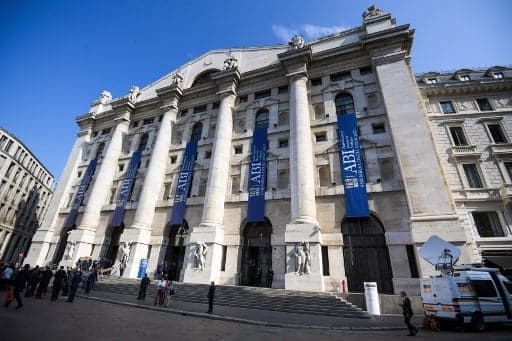Italy's government crisis hits European economy

European stock markets slumped on Friday and the pound hit a fresh two-year low against the euro as traders reacted to a fast-moving Italian political crisis and data showing Britain's Brexit-facing
economy is on the brink of recession.
"Markets tumbled on Italian political risk," said Craig Erlam, senior market analyst at Oanda trading group.
Milan's stock market sank more than two percent after Italy's far-right Deputy Prime Minister Matteo Salvini demanded snap elections on Thursday, triggering a political crisis.
READ ALSO:
The heightened political tensions in the heavily-indebted country - the eurozone's third largest economy - also caused yields to rise on Italian government bonds.
"Naturally, Italian stocks - and in particular, banks - and bonds have been hardest hit but they are dragging everyone else down with them," Erlam said.
As soon as the markets opened on Friday, the spread - or difference between yields on 10-year Italian government debt compared to those in Germany - jumped 25 points to 235 points, reflecting investor jitters.
Milan's stock exchange, opening for the first time since Salvini's statement late Thursday, plunged more than two percent.
"Uncertainty has a price: the spread, and the possible downgrade of Italy by rating agencies," Carlo Alberto Carnevale Maffe, professor at Milan's Bocconi University, told AFP.
Coincidentally, financial assessment agency Fitch is due to review its rating of Italy on Friday.
Its Italy rating currently stands at BBB with a negative outlook – two notches above "junk" or non-investment grade.
In October 2018, rating agency Moody's downgraded Italy's rating to "Baa3", just above "junk", over concerns about the budgetary choices being taken by the populist coalition of Salvini's League and the anti-establishment Five Star Movement (M5S).
READ ALSO:
The already fragile economy "will pay the consequences of this crisis", Carnevale Maffe said.
The Italian economy is already struggling. After a "technical recession" in the second half of 2018, Italy experienced zero growth in its Gross Domestic Product (GDP) in the first six months of this year.
The European Commission and International Monetary Fund (IMF) expect Italian growth to be only 0.1 percent this year, while the government has forecast it at 0.2 percent.
But some experts are even more pessimistic, arguing that Italy is heading back into recession.
Unemployment stands at 9.7 percent, hitting 28.1 percent among 15-24 year olds - well above the euro area average of 7.5 percent for the general population and 15.4 percent among the young.
Italy is also hampered by a vast debt ratio - a whopping 132 percent of GDP, the eurozone's second-biggest after Greece.
Brussels has repeatedly called on Rome to do more to reduce its public deficit, leading to clashes between the populist government in Rome and the European Commission.
Italy agreed reduce it to 2.04 percent in 2019, instead of its previous forecast of 2.4 percent, after drawn-out negotiations over the country's big-spending budget.
READ ALSO:
Comments
See Also
"Markets tumbled on Italian political risk," said Craig Erlam, senior market analyst at Oanda trading group.
Milan's stock market sank more than two percent after Italy's far-right Deputy Prime Minister Matteo Salvini demanded snap elections on Thursday, triggering a political crisis.
READ ALSO:
The heightened political tensions in the heavily-indebted country - the eurozone's third largest economy - also caused yields to rise on Italian government bonds.
"Naturally, Italian stocks - and in particular, banks - and bonds have been hardest hit but they are dragging everyone else down with them," Erlam said.
As soon as the markets opened on Friday, the spread - or difference between yields on 10-year Italian government debt compared to those in Germany - jumped 25 points to 235 points, reflecting investor jitters.
Milan's stock exchange, opening for the first time since Salvini's statement late Thursday, plunged more than two percent.
"Uncertainty has a price: the spread, and the possible downgrade of Italy by rating agencies," Carlo Alberto Carnevale Maffe, professor at Milan's Bocconi University, told AFP.
Coincidentally, financial assessment agency Fitch is due to review its rating of Italy on Friday.
Its Italy rating currently stands at BBB with a negative outlook – two notches above "junk" or non-investment grade.
In October 2018, rating agency Moody's downgraded Italy's rating to "Baa3", just above "junk", over concerns about the budgetary choices being taken by the populist coalition of Salvini's League and the anti-establishment Five Star Movement (M5S).
READ ALSO:
The already fragile economy "will pay the consequences of this crisis", Carnevale Maffe said.
The Italian economy is already struggling. After a "technical recession" in the second half of 2018, Italy experienced zero growth in its Gross Domestic Product (GDP) in the first six months of this year.
The European Commission and International Monetary Fund (IMF) expect Italian growth to be only 0.1 percent this year, while the government has forecast it at 0.2 percent.
But some experts are even more pessimistic, arguing that Italy is heading back into recession.
Unemployment stands at 9.7 percent, hitting 28.1 percent among 15-24 year olds - well above the euro area average of 7.5 percent for the general population and 15.4 percent among the young.
Italy is also hampered by a vast debt ratio - a whopping 132 percent of GDP, the eurozone's second-biggest after Greece.
Brussels has repeatedly called on Rome to do more to reduce its public deficit, leading to clashes between the populist government in Rome and the European Commission.
Italy agreed reduce it to 2.04 percent in 2019, instead of its previous forecast of 2.4 percent, after drawn-out negotiations over the country's big-spending budget.
READ ALSO:
Join the conversation in our comments section below. Share your own views and experience and if you have a question or suggestion for our journalists then email us at [email protected].
Please keep comments civil, constructive and on topic – and make sure to read our terms of use before getting involved.
Please log in here to leave a comment.